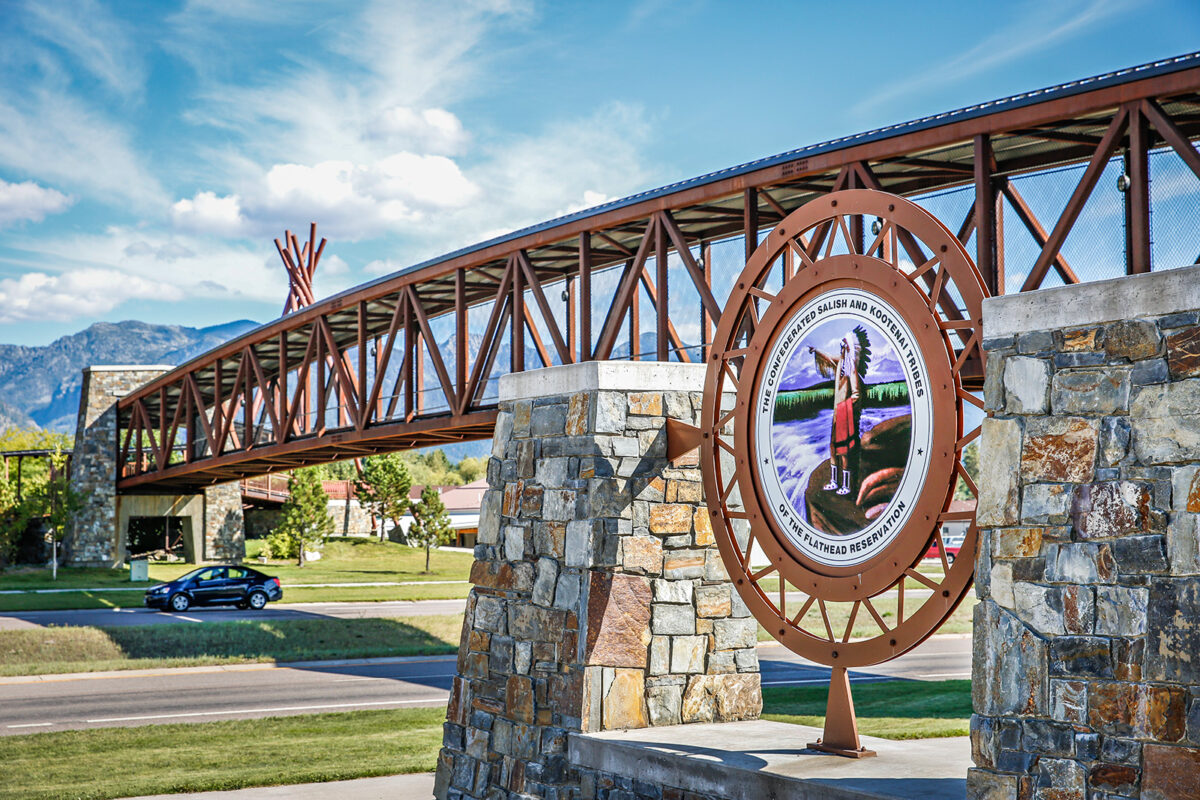Judge Sides with State in Flathead Reservation Law Enforcement Dispute
District Court Judge Amy Eddy ruled last week that the court cannot award damages to Lake County in an ongoing legal battle over who is responsible for criminal justice on the Flathead Reservation
By Denali Sagner
The ongoing legal dispute between Lake County and the state of Montana over criminal law enforcement jurisdiction on the Flathead Reservation reached a crossroads last week after District Court Judge Amy Eddy on Nov. 9 denied the county’s request for declaratory relief, ruling in favor of the state.
Lake County in July 2022 sued the state of Montana over the enforcement of Public Law (PL) 280, a 1953 federal law that authorized states to unilaterally assert criminal and/or civil jurisdiction over Native American reservations. While the law technically transferred criminal jurisdiction from the Confederated Salish and Kootenai Tribes (CSKT) to the state, Lake County has carried out law enforcement duties on the reservation for 60 years. In the lawsuit against the state, Lake County has argued that by refusing to reimburse the county for growing law enforcement costs, the state has left an unfunded mandate and pushed costs onto the county government that the state would otherwise be required to incur.
Lake County has overseen criminal enforcement on the Flathead Reservation since 1965, when the state of Montana assumed the federal government’s law enforcement responsibilities through an act of the Montana Legislature. The CSKT signed onto the agreement on May 19, 1964. The CSKT was the only tribal government in Montana to come under PL 280, with the state’s six other tribal entities remaining under federal jurisdiction.
Approximately two-thirds of the Flathead Reservation is located within the bounds of Lake County.
In 1994, the CSKT entered into a memorandum of agreement with the state to reassume jurisdiction over misdemeanor crimes committed by tribal members, but to leave felony prosecution to the state.
CSKT leadership has declined to comment on the ongoing conflict over PL 280. Tribal members and civil rights advocates, however, have described PL 280 as a “failed policy” that subjugates tribal members and encroaches on CSKT’s sovereignty, and have argued that CSKT’s 1964 agreement to adopt PL 280 was made under duress.
“PL 280 is that invitation by the federal government for intrusion by the state government into the civil and criminal jurisdiction of tribal peoples that subverts their inherent sovereignty and which leaves everyone less safe,” Keegan Medrano, former director of policy and advocacy for the American Civil Liberties Union (ACLU) of Montana, said during a legislative hearing earlier this year.
Though PL 280 technically transferred criminal powers and responsibilities to the state of Montana, officials in Lake County have long argued that the agreement left the county with the financial burden of law enforcement, one that has become overwhelming in recent years. Because a sizable portion of Lake County property is tax-exempt, Eddy’s Nov. 9 ruling reads, “Lake County is without adequate revenue to construct a detention facility or expand law enforcement” as criminal incidents increase.
The Legislature in 2021 amended Montana Code Annotated to allow Lake County to withdraw from PL 280 and turn law enforcement over to the state. The Legislature also required the state to reimburse the county for criminal enforcement costs. While the bill, which was introduced by Rep. Joe Read, R-Ronan, originally appropriated $2.2 million to Lake County, a last minute amendment reduced the appropriation to just $1.
In Eddy’s ruling, the Flathead County District Court judge wrote that “this Court has previously characterized [the $1 appropriation] as, and now reiterates, patently absurd.”
Though the bill allowed the county to withdraw from the agreement, the county government has not done so because “the State itself lacks the infrastructure and personnel to effectively exercise criminal jurisdiction over CSKT,” leaving Lake County with “no alternative,” according to the lawsuit.
Citing unsustainable costs, the Lake County Commissioners on Jan. 3 passed a resolution to withdraw from PL 280 and leave law enforcement to the state.
The Lake County commissioners could not be immediately reached for comment.
The 2023 Legislature passed House Bill 479, also brought by Read, that set out to create a PL 280 task force and appropriate $2.5 million to Lake County per year for two years to cover law enforcement costs until an official agreement was reached. After passing the House and Senate largely on party lines, Gov. Greg Gianforte vetoed the bill.
After the governor’s veto, the county postponed its decision to withdraw from the agreement.

In July 2022, prior to the introduction of House Bill 479, Lake County filed a lawsuit in district court that charged the state of Montana with imposing an unfunded mandate and unjustly defraying costs onto the county that it would otherwise be responsible for. The county also asked for an award of damages amounting to past and present costs that it incurred while providing law enforcement services under PL 280.
Though Eddy concurred with the county about the $1 appropriation, the judge argued that it is not the responsibility of the courts to settle the dispute between the county and the state.
Eddy noted that Montana Code Annotated does not specify any dollar amount that the state is required to provide to Lake County and that the county can technically, by law, relieve itself of its law enforcement responsibilities on the Flathead Reservation.
“The State argues Lake County has the power to withdraw its consent if it is dissatisfied with this appropriation and Lake County’s failure to do so has produced ‘a self inflicted injury.’ As a practical matter, the State dares Lake County to act upon its threat,” the ruling reads.
Given the fact that the state is not required to appropriate any specific amount of money, “coupled with the ability of Lake County to withdraw consent, this Court lacks the authority to grant the relief Lake County seeks,” Eddy wrote, adding that if Lake County feels overburdened by the cost of law enforcement, “its remedy is to withdraw.”
“It is unfortunate that, during a legislative session noteworthy for its unprecedented budget surplus, the parties were unable to reach an agreement to provide for the ongoing safety and security of the Flathead Indian reservation and Lake County,” the judge wrote.
In a letter to the Lake County Leader, commissioner Gale Decker said that the county commission is “considering whether or not to appeal [Eddy’s] decision to the State Supreme Court.”
A spokesperson for the governor’s office said, “The administration is pleased to see the court reaffirm the law, and remains eager to work with the county and tribes to find a solution.”
Editor’s Note: This story has been updated to include a comment from the governor’s office.